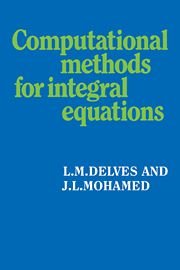Book contents
- Frontmatter
- Contents
- Preface
- 0 Introduction and preliminaries
- 1 The space ℒ2(a,b)
- 2 Numerical quadrature
- 3 Introduction to the theory of linear integral equations of the second kind
- 4 The Nystrom (quadrature) method for Fredholm equations of the second kind
- 5 Quadrature methods for Volterra equations of the second kind
- 6 Eigenvalue problems and the Fredholm alternative
- 7 Expansion methods for Fredholm equations of the second kind
- 8 Numerical techniques for expansion methods
- 9 Analysis of the Galerkin method with orthogonal basis
- 10 Numerical performance of algorithms for Fredholm equations of the second kind
- 11 Singular integral equations
- 12 Integral equations of the first kind
- 13 Integro-differential equations
- Appendix: Singular expansions
- References
- Index
10 - Numerical performance of algorithms for Fredholm equations of the second kind
Published online by Cambridge University Press: 07 December 2009
- Frontmatter
- Contents
- Preface
- 0 Introduction and preliminaries
- 1 The space ℒ2(a,b)
- 2 Numerical quadrature
- 3 Introduction to the theory of linear integral equations of the second kind
- 4 The Nystrom (quadrature) method for Fredholm equations of the second kind
- 5 Quadrature methods for Volterra equations of the second kind
- 6 Eigenvalue problems and the Fredholm alternative
- 7 Expansion methods for Fredholm equations of the second kind
- 8 Numerical techniques for expansion methods
- 9 Analysis of the Galerkin method with orthogonal basis
- 10 Numerical performance of algorithms for Fredholm equations of the second kind
- 11 Singular integral equations
- 12 Integral equations of the first kind
- 13 Integro-differential equations
- Appendix: Singular expansions
- References
- Index
Summary
The comparison of algorithms
As we have introduced and discussed the various possible schemes for solving Volterra and Fredholm equations of the second kind, we have made a number of general qualitative and quantitative comparisons of the methods, in terms of their cost (for a given discretisation size N), their likely accuracy (for a given N) and rate of convergence (as N increases), their stability and the ease with which usable error estimates can be provided for the method. It is unfortunately a truism that the performance of a method in practice is also affected by apparently minor details of the implementation (that is, of the program). It is also true that comparisons based on one or two numerical examples can be misleading; an overall picture of the performance of a method depends on its behaviour over a wide class of problems. In this chapter we consider in some detail how objective comparisons between methods can be made and we illustrate the problems by looking at the performance of several specific routines for solving second kind Fredholm equations. These detailed comparisons are very interesting but, when two different algorithms give fairly close results, the reader is warned of the dangers of mentally ranking the algorithms: different implementations of the algorithms might well rank in the reverse order, so that only quite large differences in performance should be taken seriously.
Implementations of a given algorithm can be of two main types, namely automatic or non-automatic routines.
- Type
- Chapter
- Information
- Computational Methods for Integral Equations , pp. 231 - 260Publisher: Cambridge University PressPrint publication year: 1985



